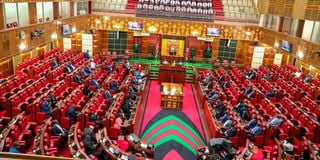Happening Now: LIVE: Agriculture CS Mithika Linturi's impeachment trial
Parliament gets green light to proceed with housing bill

A past sitting at the National Assembly.
The High Court has dismissed a petition challenging the Affordable Housing Bill, 2023 saying there was adequate public participation before the Bill was passed.
Mr Lawrence Omule Apiyo moved to court last year saying the process was rushed without meaningful and adequate public participation.
Parliament passed the Bill last month, which was re-introduced after the High Court quashed section 84 of the Finance Act, 2023 which introduced the Affordable Housing Levy for lack of a legal framework.
The new Bill establishes the Affordable Housing Fund, which will be financed through a 1.5 percent housing levy on gross salaries.
“This court concurs with the respondents on their position that the petition herein breached the principle of ripeness as the petitioner presumed that the 3rd respondent intended to conduct public participation through one mode, which is through submission of memoranda when he filed this petition,” Justice Mwanaisha Sharrif said.
The judge noted that public hearings and consultations with stakeholders and experts were concluded on January 30 and Affordable Housing Bill has already undergone a second reading before parliament and MPs endorsed it.
Justice Sharrif said public participation conducted by Parliament was effective and constitutionally compliant.
She said the Bill will provide a legal framework upon which the government will implement the Affordable Housing Levy and that the clerk of the National Assembly invited stakeholders and technical experts on January 12 and there were public hearings in 20 counties.
The Bill was brought before the House by Majority leader in the National Assembly Kimani Ichungwah on December 4, 2023.
Mr Apiyo argued that public participation was condensed from 14 to three days before it was sent to departmental committee on Housing, Urban Planning and Public Works and that of Finance and National Planning.
The Clerk of the National Assembly submitted that the public was invited to present their memoranda on December 9 and gave a deadline for December 28.
To Mr Apiyo, there was no adequate and effective public participation, especially because the marginalised were not considered as they were not allowed to submit their views.
According to the petitioner, there was no awareness, involvement and feedback mechanism but what happened was a cosmetic public participation.
He added that the government had no intention of facilitating adequate and effective public participation.
Housing PS Charles Hinga said the government sought to provide a legal framework for the Housing Levy after the High Court declared section 84 of the Finance Act unconstitutional.
Mr Hinga added that the petition wanted to scuttle a constitutional process, yet the government was planning construct four million houses at the end of the current term.
The PS added that the submission of memoranda was just one of the ways used for public participation.
The bill is currently before the Senate for constitutional assent as it affects counties.





